The Class Struggle in France
Maurizio Lazzarato
Maurizio Lazzarato is an independent Italian sociologist and philosopher residing in Paris. Exiled in France following the repression unleashed in April 1979 against the Autonomia Operaia movement, in which he participated at the University of Padua, he is the author of numerous books and articles on immaterial labor, cognitive capitalism, biopolitics and bioeconomy, debt, war, and what he calls the "state-capital machine." For further remarks on the Russia-Ukraine war, see his article “War, Capitalism, Ecology.”
Other languages: Italiano, Español
Let’s cut straight to the heart of the matter: following the large demonstrations against pension “reforms,” President Macron decided to “force his way” by bypassing parliament and imposing a sovereign decision to adopt a law raising the retirement age from 62 to 64. In the demonstrations, the immediate response has been to say that “we, too, are forcing our way.” Between two opposed wills — in this case, the sovereign will of the state-capital machine and the will of the [working] class — it is force that decides. The labor-capital compromise has been broken since the 1970s, but the financial crisis and the war have further radicalized the conditions of the confrontation.
Let us try, then, to analyze the two poles of this power relation, which is based on force, in the political conditions between 2008 and 2022.
The French March
The movement appears to have grasped the political phase change that was provoked, first and foremost, by the 2008 financial crisis and, subsequently, by the war. It has made use of several forms of struggle developed by the French proletariat over the course of the last few years, bringing them together, articulating them, and, in so doing, legitimizing their differences. Trade union struggles, with their peaceful marches, have gradually been transformed through the integration of un-waged participants (on March 23, for example, the presence of youth, university and high school students was massive), who have initiated multiple days of “wildcat” [sauvage] demonstrations that took off at dusk into the streets of Paris and other big cities (where they were even more intense).
This strategy of group-action, which moves constantly from one part of the city to another, lighting fires as it goes, is clearly inherited from the Gilets Jaunes. Instead of peacefully parading between République and Nation, the latter opted to begin “terrorizing” the bourgeoisie, bringing “fire” to the wealthy neighborhoods in the West of Paris. On the night of March 23, 2023, 923 fires were counted in the city of Paris alone. According to the cops, the “wildcat” nights reached a higher level of intensity than the “invasion” of the Gilets Jaunes.
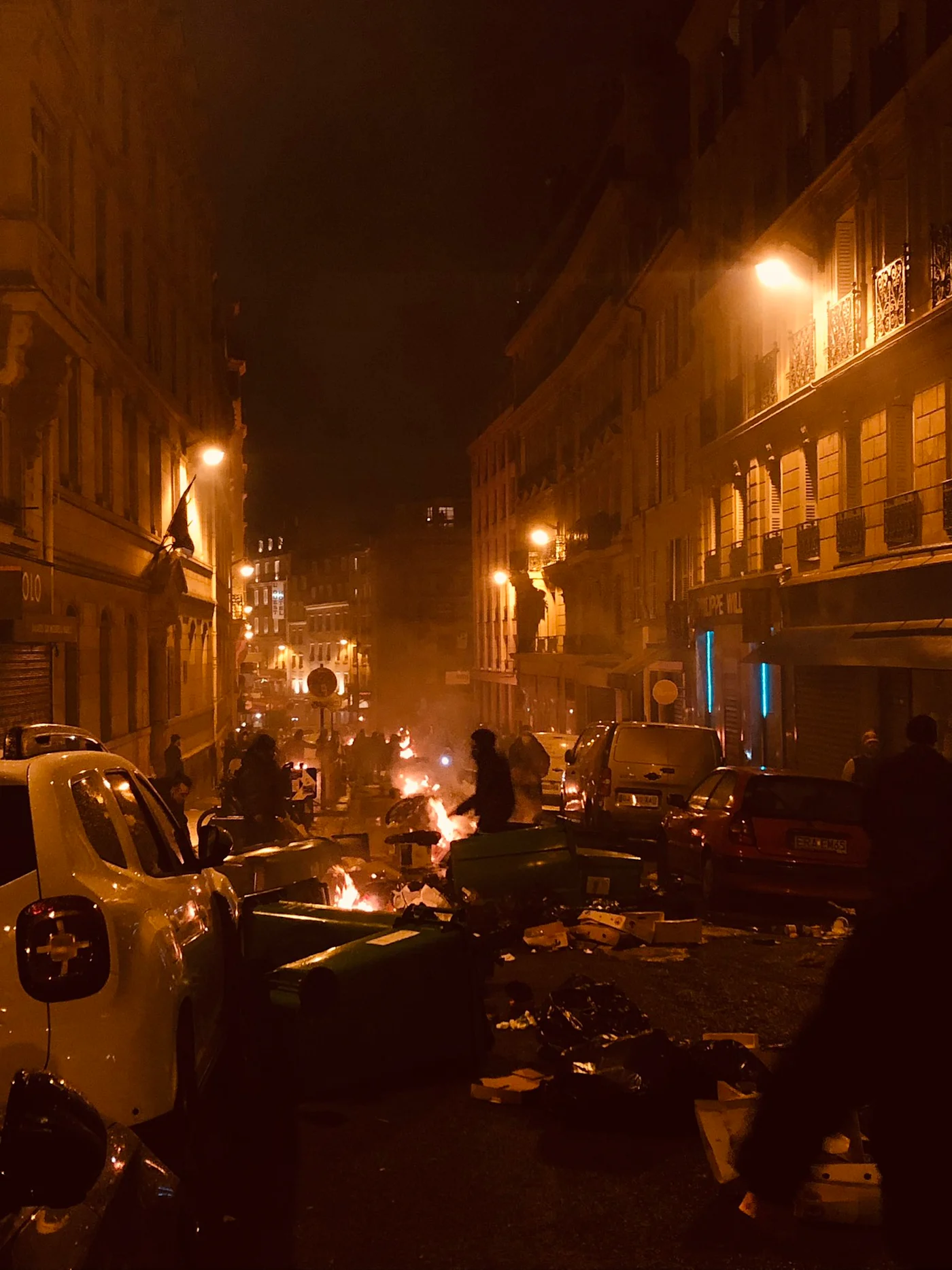
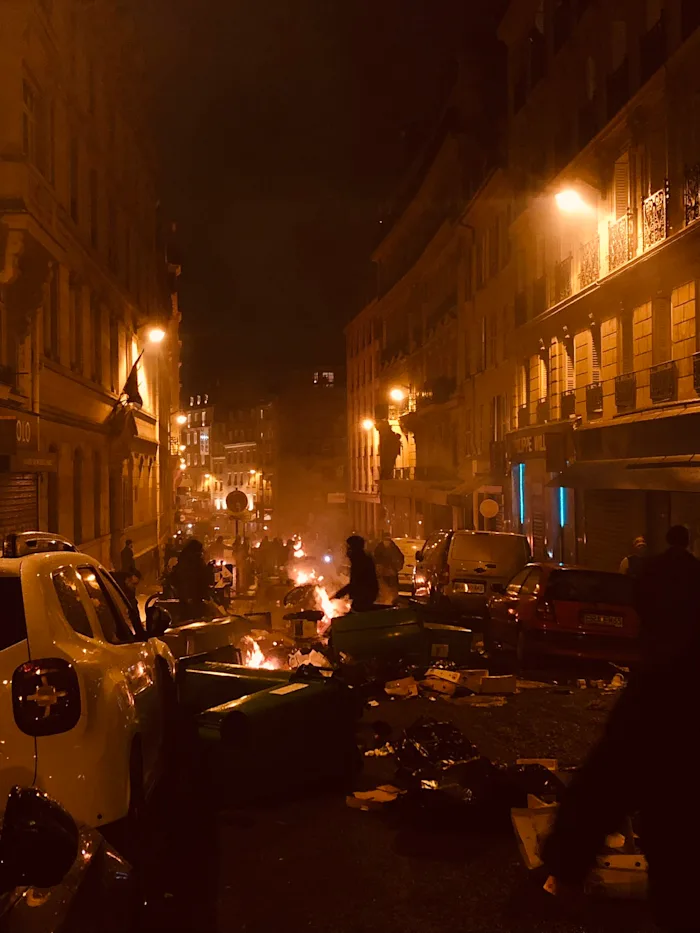
No trade union, not even the one most sympathetic to the president (CFDT) has condemned the “wildcat” demonstrations. The media, which is owned entirely by oligarchs who waited impatiently for a reversal in public opinion following the first bits of “violence,” has been disappointed: two thirds of French people have continued to support the revolt. The “sovereign” refused to meet with the trade unions, clearly signaling his desire for direct confrontation without mediation. From this, everyone has deduced that there was but one strategy to adopt, namely, to articulate different forms of struggle together without paying any attention to the distinction between “violence” and “pacifism.”
The massification and differentiation of participants in the marches can also be seen on the picket lines, which are just as if not more important than the demonstrations themselves. Macron’s choice was likely also motivated by the not entirely successful blockade of the general strike on March 7 (by March 8, the situation had become almost normal!). But what Macron did not foresee was the acceleration of the movement following the decision to apply the 49.3 provision.
The only movement that has not been integrated into the struggle is the revolt in the banlieues. Nor was any juncture between “petits blanc” (the poorest bracket of the white proletariat) and “barbares” (French children of immigrants, the “indigenous people of the republic”) achieved this time around. This matters, as we will see later, since it is the possible global revolution, the juncture between North and South, that is at stake here.
There has been a de facto and universally accepted coordination between mass struggles and the those of a minority faction dedicated to prolonging the conflict into the night through the use of trash bins that pile up on the side of the road (on account of the garbage collectors’ strike) to block the police and to take out the “zbeul” (mess, from the Maghrebian Arabic zebla, trash). For the moment, let’s call this the “vanguard,” because I don’t know what else to call it, while I hope that the usual idiots won’t hurl accusations of Leninism at me. It is not a matter of bringing consciousness to a proletariat who lacks it, nor is it about the function of political leadership, but instead a matter of composing the struggle against the iron fist imposed by the established powers. The relationship between masses on the one side, and active minorities on the other, is present in all revolutionary movements. It is not a question of suppressing this relation, but of rethinking it under new conditions.
Before the great mobilizations that we are seeing today, there were differences and divisions that traversed the French proletariat, weakening its power to wage offensives. We can only summarize them here: trade unions and institutional left-wing parties (with the exception of la France Insoumise)1 never understood the Gilets Jaunes movement — neither the nature of its workers nor their demands, which fell outside the classical norms of salaried workers. As a result, their struggles were met with indifference, or even hostility. On the other hand, it is an open enmity that these same parties (with the exception of la France Insoumise) display toward the “barbares” of the banlieues, joined by a portion of the feminist movement, when they all succumbed to the racist campaigns waged by the [established] powers and media against the “Islamic veil.” For their part, neither the feminists nor the “barbares” have managed to develop their own autonomous and independent forms of organization capable of forcing the unions and other closed parties (whose base is constantly shrinking) to take them seriously. Within the “barbares,” a decolonial theory has developed, many of whose positions touch on other struggles as well, but which has never managed to take root in the quartiers and develop a mass organization. The feminist movement, for its part, is well organized and has developed lucid and detailed analyses, expressing radical positions, but it does not bring about political ruptures of this magnitude. It has not waged its own political battle within the ongoing struggles, in spite of the fact that women are certainly the most impacted by the “reforms.” The French proletariat is thus fragmented by racism, sexism, and new forms of precarious work.
The movement underway has shifted these lines, which is to say that it has displaced certain rifts, partially recomposing differences. Ecological actions have also recovered their strength and found resources through the current struggles. In the days that followed the clashes at Sainte-Soline, where crowds attacked the construction of mega-basins designed to collect water for industrial agriculture, and against which the police deployed weapons of war, have inspired indignation and mobilized “wildcat” demonstrations of their own, albeit on a smaller scale.
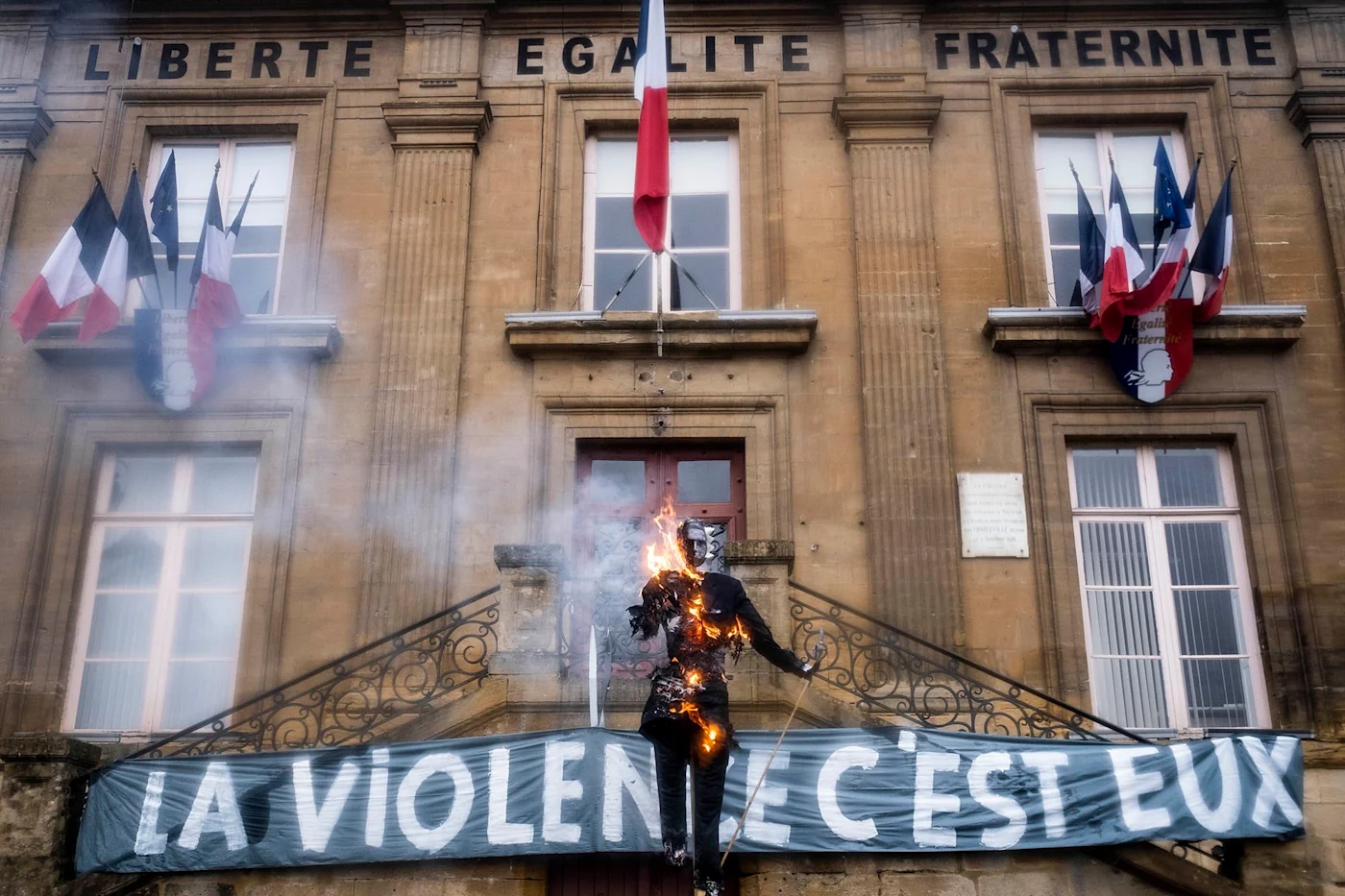
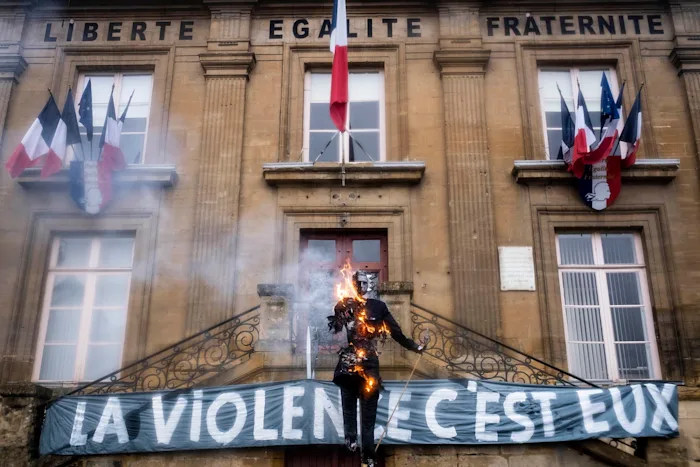
Does this signal a leap in recomposition? Perhaps it is too soon to tell. In any case, the various movements that have traversed France in recent years have grafted themselves onto union mobilization while conferring upon it a different image and substance: a contestation of power and capital. In two months, they have burned Macron and left his presidency at an impasse.
When the political system of Western countries becomes oligarchic and consensus can no longer be maintained by wages, revenues, and consumption, since the latter are subject to continuous blockades and reductions, the police become the fundamental axis of “governance.” Macron has managed the social struggles of his presidency by means of the police alone.
A certain brutality of intervention now forms the heart of the French strategy for maintaining order. France not only has a great revolutionary tradition; it also has a tradition of exercising counter-revolutionary violence, unprecedented in the colonies and proportional to the danger posed to power in the metropole (where, in 1848, they called in l’Armée d’Afrique, which had conquered Algeria, in order to suppress the revolution).
Henceforth, the stakes of the movement are no longer reducible to work and the rejection thereof but concern the very future of capitalism and its state, as is always the case when wars between imperial powers break out!
The lesson to be drawn from these two months of struggle concerns the urgency of rethinking and reconfiguring the question of force, its organization, and its utilization. Tactics and strategy are again becoming political necessities, questions with which movements thus far have tended to overlook, having instead focused almost exclusively on their specific relation to power (sexism, racism, ecology, wages, etc.). Yet, by objectively moving together in the absence of any subjective coordination, they have raised the overall level of confrontation while deconstructing constituted power. Either the problem of the rupture with capitalism and everything it entails will be resolved, or else our actions will remain exclusively defensive. Historically, when war breaks out between imperialist powers, what emerges is always the possibility of imperialism’s “collapse” (from which a new division of power on the global market and a new cycle of accumulation can also follow). The USA, China, and Russia are fully aware of what is at stake. It is unclear whether class struggle can match that level of confrontation.
Western autocracy
The French constitution still provides for the possibility of a “sovereign” decision within the bounds of so-called democratic institutions. Hence the invention of 49.3, which allows one to legislate without having to pass through parliament. This provision signals the inscription within the constitution of an entire chain of processes for producing political centralization that began well before the birth of capitalism. The centralization of military force (the legitimate monopoly of its exercise), which also predates capitalism, constitutes the other indispensable condition for the emergence of the state-capital machine. The latter, for its part, will immediately initiate the centralization of economic force through the constitution of monopolies and oligopolies that have only grown in size and in economic and political weight throughout the long history of capitalism.
A significant portion of political thought has ignored the real existence of capitalism, downplaying its processes of “sovereign” centralization and thereby clearing the way for the concepts of “governmentality” (Foucault), “government” (Agamben, who was quite agitated during the pandemic, but disappeared with the hardly biopolitical war between imperialisms), and “governance.”
Foucault’s declarations are symptomatic, in this regard, of the counter-revolutionary theoretical climate: “Economics is a discipline without totality; economics is a discipline that begins to demonstrate not only the pointlessness, but also the impossibility of a sovereign point of view over the totality of the state that he has to govern.”2 Monopolies are the “sovereigns” of the economy, which will only increase their will to totalization through their merger with the “sovereign” power of the political system and “sovereign” powers of the army and the police.
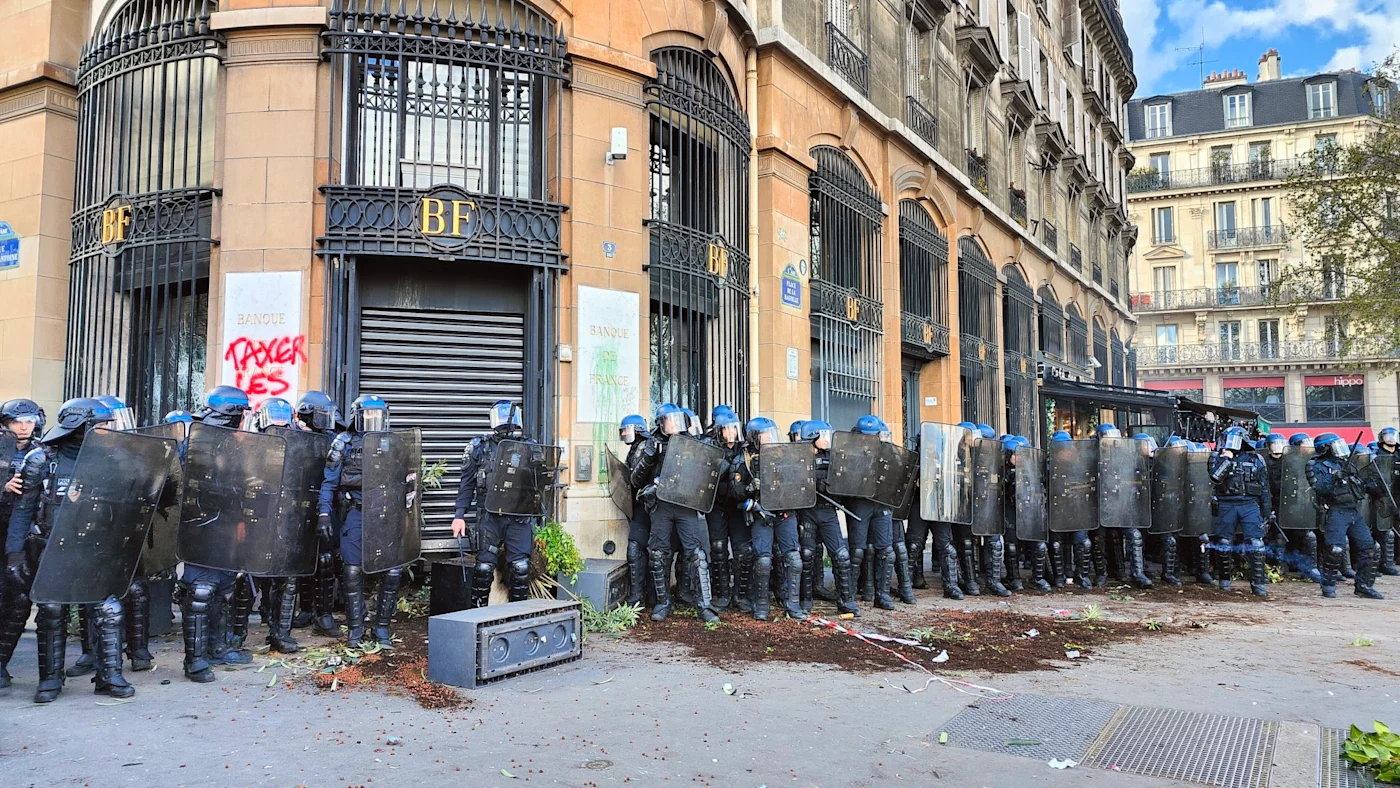
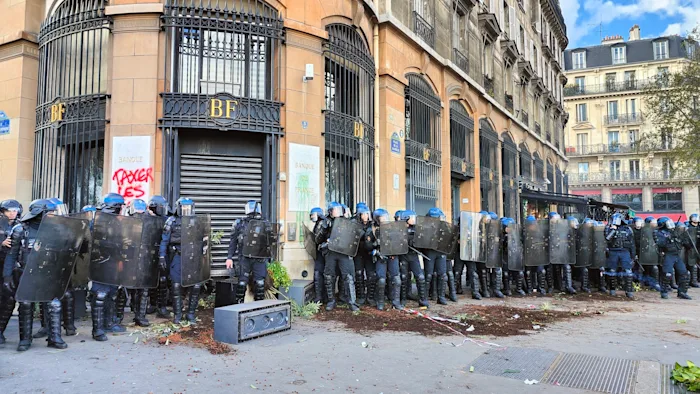
Capitalism is not identical to liberalism or neoliberalism. The two are radically distinct, and it is absurd to describe the development of the state-capital machine as a passage from sovereign societies to disciplinary societies and societies of control. The three centralizations complement each other by always commanding forms of governmentality (liberal or neoliberal), which they may either use or abandon during moments when the class confrontation becomes more radical.
The enormous disequilibrium and polarizations between states and classes that centralizations generate lead directly to war, which once again expresses the truth of capitalism (the clash of imperialisms), a fact which has immediate political repercussions, particularly for smaller European states. While the French president asserts his sovereignty against his “people,” he simultaneously loses a sizable chunk of it, as a good vassal, to the USA, which, thanks to the war against the Russian “oligarch," has replaced the Franco-German axis with that of the US, Great Britain, and the Eastern countries, at the center of which the US has installed Poland, the most reactionary, sexist, clerical, homophobic, anti-worker, war-mongering country in Europe. From this point forward, not only is the federal hypothesis utopian, but the same is true of the Europe of Nations. The future will be made of nationalisms and new fascisms. If someone wanted to resurrect the European project after another new servile acquiescence to the logic of dollar imperialism, they would first have to engage in a struggle for liberation from Yankee colonialism.
On the international stage, France still counts for less than it did before the war, but like all little marginal marquises, Macron is unleashing all his animosity and impotence upon his “subjects” for whom he reserves treatment by his police.
According to the Financial Times from March 25, 2023, “France has the regime which, among the most developed countries, is most often compared to an autocratic dictatorship.” It is amusing to see the international press of capital (the Wall Street Journal) get alarmed that “Macron’s forced march to transform the French economy into a pro-business environment is done at the expense of social cohesion.” Their actual concern is not for the living conditions of the millions of French proletarians, but concerns the “populist” danger that might threaten the Atlantic Alliance, NATO, and by extension, the USA, who directs it: the “parliamentary rebellion” and the “chaos that is unfolding across the country raise disturbing questions about the future of the country for all those who hope that France will remain firmly in the liberal, pro-EU, pro-NATO camp” (Politico). The Financial Times believes that France “is following the Americans, British, and Italians in opting for the populist vote.” It’s hard to tell whether such people are hypocrites or just irresponsible. They want to have their cake and eat it too: financial and monopolistic returns and social cohesion, democracy and the dictatorship of capital, tax-exempt businesses, generously financed by a system of social protection completely twisted in their favor, and social peace. Der Spiegel speaks of a “deficit of democracy,” of “a danger to democracy itself”; meanwhile, these are the same economic policies that daily uphold the causes of Western autocracy, which have absolutely nothing, and I mean nothing, to envy in those of the East.
The global cycle of struggles after 2011
What we are only just beginning to see in the struggles in France — namely, the contestation of power and capital — is what struggles in the global South immediately realized starting in 2011.
In the 20th century, the South served a decisive strategic function, even more so than the struggles in the West. The international dimension of force relations plays a decisive role when it comes to regaining the initiative. The 2008 crisis not only opened up the possibility of war (which arrived in due time), but also the possibility of revolutionary ruptures (the reality of struggles has obliged them to shift in this direction if they do not wish to be swept away by the joint actions of war and new fascisms).
The latest globalization has not simply compounded the differences between the North and the South; it has also created Norths in the South and installed Souths in the North. Under no circumstances should it be concluded from this that there is a homogeneity of political behaviors and processes of subjectivation between the North and the South. The center-periphery polarization is immanent to capitalism and must imperatively and continuously reproduce itself. Without the predation of the “South,” without, that is, the imposition of a Lumpen-development and an “unequal exchange” (Samir Amin), the rate of profit is destined to drop exponentially, and this despite all the innovations, technologies, and interventions that the North can muster under the control of the greatest techno-scientific entrepreneur, the U.S. Pentagon. This is the most important reason for the current war. The South wants to leave this relation of subordination, and has, in fact, already partially done so. It is this political will that threatens American financial and monetary hegemony and its political and productive supremacy.
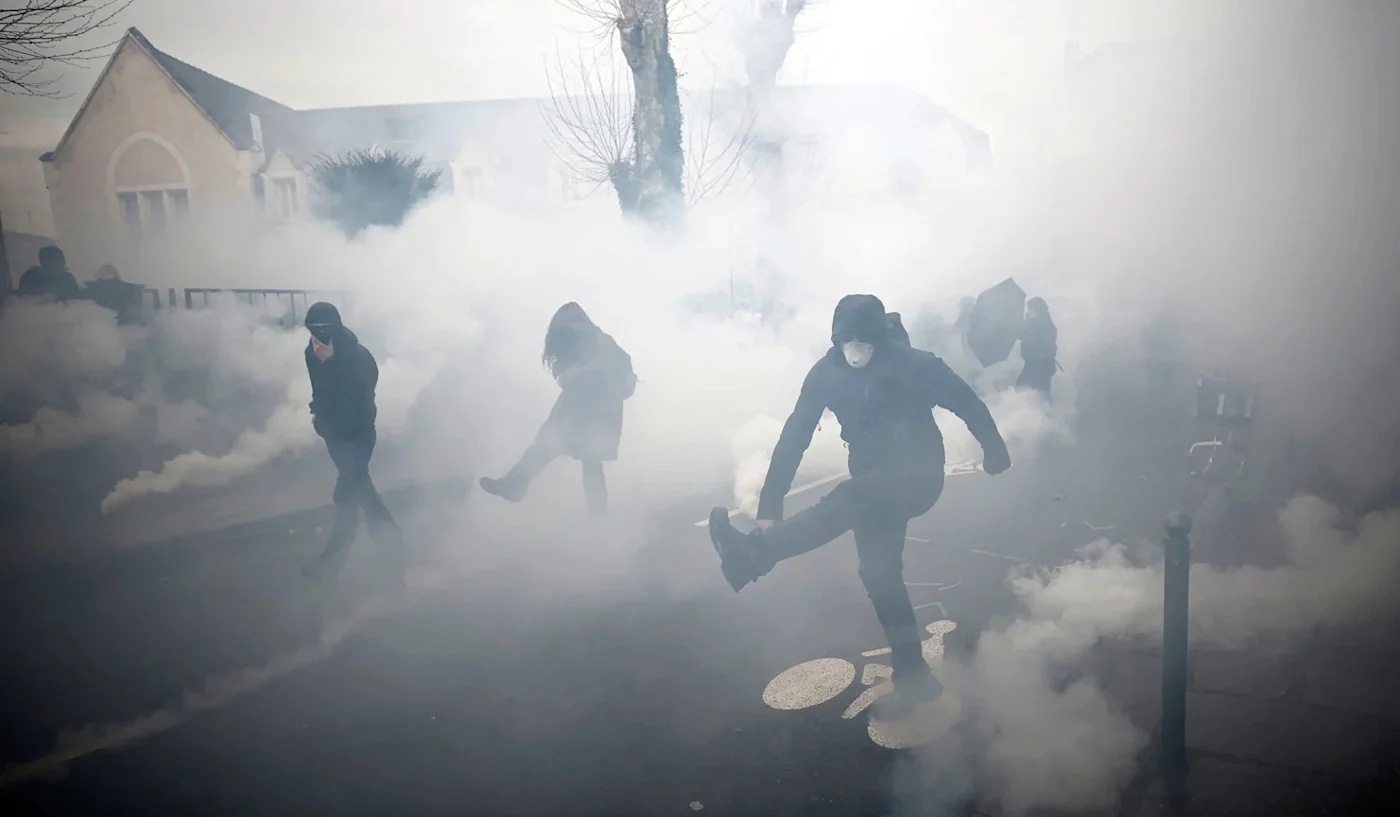
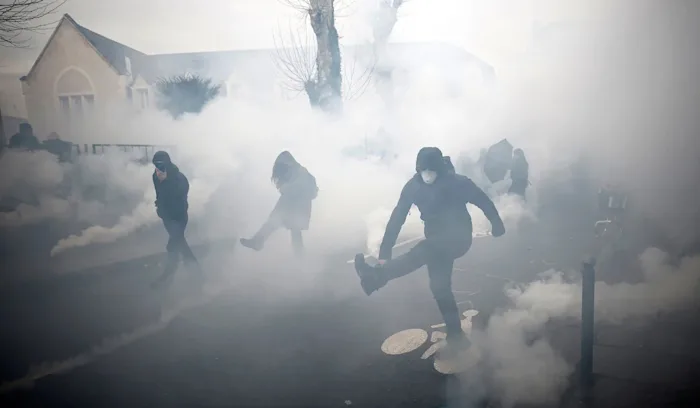
There are at least two important political differences that remain between the West and the rest of the world. Despite the fact that they constitute one of the poorest and most exploited strata of the French proletariat, the persistent failure to integrate the “barbares” in the French banlieues into the current cycle of struggles is already a symptom, internal to Western countries, of the difficulties involved in overcoming the “colonial divide” from which Whites have long profited.
In the context of the cycle of struggles that began in 2011, a differentiation similar to that of the 20th century is reappearing. Back then, the socialist or national liberation revolutions (with socialist connotations in each case) that spread across the South erupted alongside mass struggles in the West, occasionally very strong ones, but all of which proved unable to generate successful revolutionary processes. Today, we have massive strikes in Europe (France, Great Britain, Spain, and even Germany) and, on the contrary, veritable revolts, insurrections, and the opening of revolutionary processes in the South. Let’s take a few examples — Egypt and Tunisia, who inaugurated the cycle in 2011, and Chile and Iran, more recently — in order to highlight the differences and possible convergences [between now and then].
It is difficult to compare the Arab Spring uprisings to “Occupy Wall Street,” even if there was a circulation of forms of struggle: the destitution of constituted power, millions of people being mobilized, political systems shaken to their very foundations, a repression resulting in hundreds of deaths, the possibility of initiating a real revolutionary process that was immediately aborted because, as a sign in Cairo read during the uprising, “half revolution, no revolution.” Occupy Wall Street never witnessed force relations of that magnitude. Neither did it produce, even for brief periods, “voids,” the destructuring or delegitimizing of apparatuses of power, like the uprisings in the South occasionally do. It is always the South that opens and promotes new waves of struggle (see also South American feminism) that are reproduced with less intensity and strength in the North. In Chile, neoliberalism was born following the physical destruction by the state-capital machine of revolutionary processes, a machine that called upon Hayek and Friedman to rebuild the market, competition, and human capital following the massacre (never confuse neoliberalism with imperialism or with capitalism, always distinguish them!). Chile gave rise to another kind of insurrection, from which we can learn other lessons, even if, as in North Africa, they concern political defeats.
By contrast with Egypt, in Chile a multiplicity of movements (notably the feminist and indigenous movements) found expression within the revolt. But at a certain moment of class struggle, we are confronted by a power that is no longer only patriarchal or heterosexual, no longer only racist, no longer only the power of the master, but the general power of the state-capital machine that includes each of these powers, reorganizes them, and at the same time exceeds them. The enemy is not even just national power, the sovereignty of a state like Chile. In such situations, if we are directly confronted with imperialist policies this is because any political rupture — as was the case in Egypt (more so than in Tunisia) or in Chile or Iran — risks calling into question the relations of force on the world market, the global organization of power: the Chilean and Egyptian uprisings were closely tracked by the USA, which did not hesitate to intervene with its “strategic interference.” A similar situation occurred in France: what began as a struggle of the “trades” quickly found itself confronting the totality of the state-capital machine. In these moments of struggle, there is a point of no return for both protagonists, for it is not possible to sustain stable forms of counter-power, “liberated” zones or territories, except for short periods of time. The Zapatista solution is neither generalizable nor reproducible (as the Zapatistas themselves have always stated). It is hard to see how a sustainable “dual power” could be implemented within the current conditions of capitalism. At the same time, the seizure of power has not seemed to be much of a priority since 1968. The situation is puzzling, to say the least!
Despite the political differences between the North and the South, certain shared problems emerge: what political subject can we construct that would be capable both of organizing the multiplicity of forms of struggle and perspectives, and posing the question of dual power and the organization of force?
Revolts and insurrections (but also, albeit in a different way, the struggles in France) produce a series of enigmas or impossibilities: the impossibility of totalizing and synthesizing struggles, and the impossibility of remaining in a situation of dispersion and differentiation; the impossibility of avoiding revolt through a deconstruction of power, and the impossibility of seizing power; the impossibility of organizing the passage from multiplicity to the dualisms of power that are imposed upon us, in one fashion or another, by the enemy, and the impossibility of remaining strictly within the plane of multiplicity and difference; the impossibility of centralization, and the impossibility of confronting the enemy without centralization. The struggle against these impossibilities forms the condition for a revolutionary creation of the possible. It is only under these conditions, by resolving these enigmas, by overcoming these impossibilities that the impossible becomes possible.
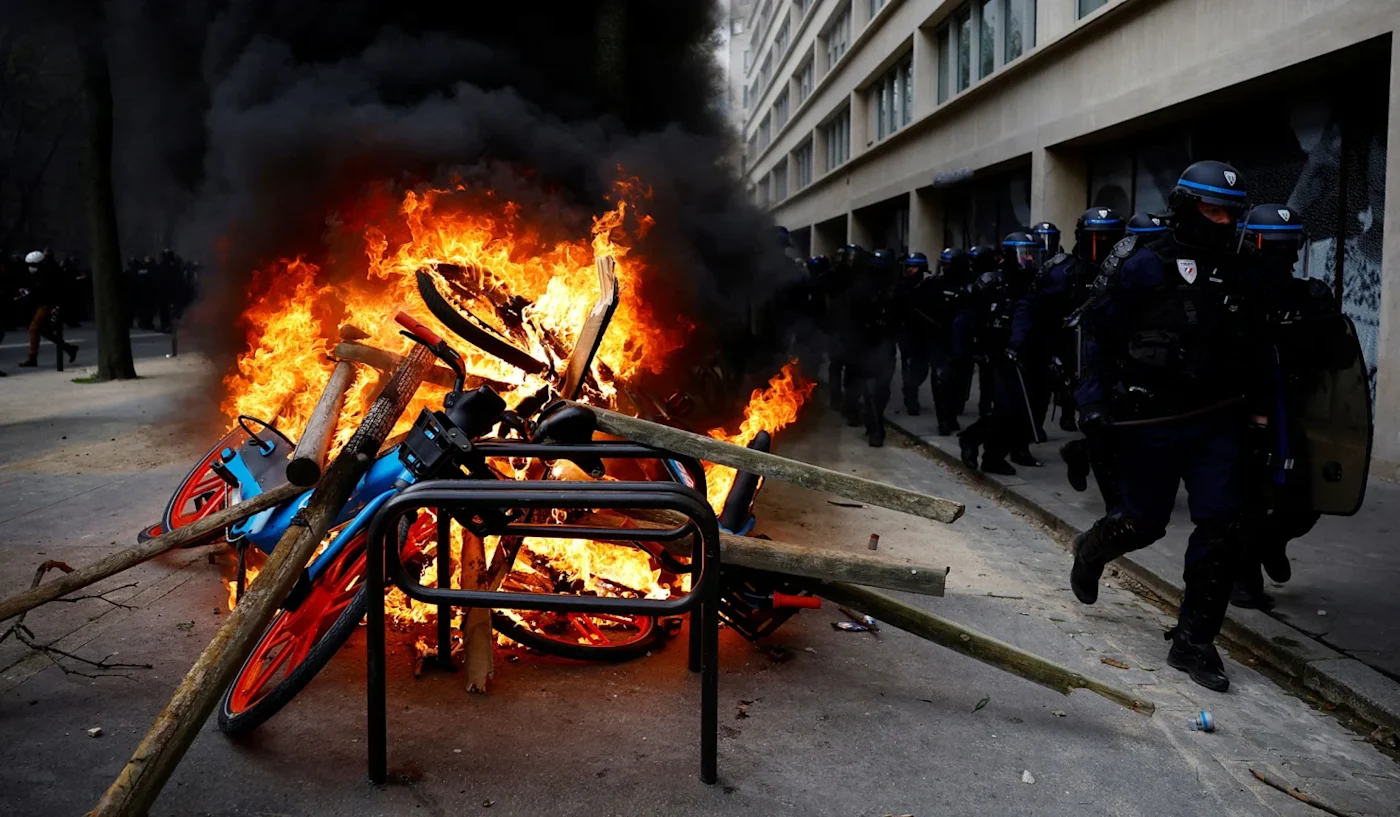
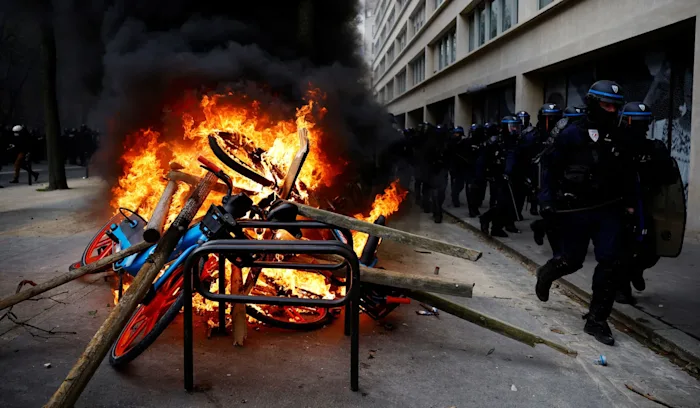
The second major difference between the North and the South concerns the ongoing war and imperialism. Imperialism refers to the qualitative leap that was reached through the integration of the three processes of economic, political, and military centralization, a leap sanctioned by the First World War. These processes reach their apogee in the “neoliberalism” of free competition, free enterprise, and the fight against any concentration of power that distorts competition. Not content with the predation they carry out on a global scale and the reorganization of welfare that they have forced in their favor, these processes are carried to the point of imposing, as they do, the inflation of profits (“pricing power,” the ability to fix prices, even if it runs counter to their own self-proclaimed “neoliberalism”).
The French movement has not articulated itself in terms of the war between imperial powers. Yet the struggle against pension reforms remains part of this framework, even if the question has never been posed, and even if the fact that Europe is at war and that the West is reorganizing welfare into warfare changes the political picture considerably. It is perhaps better this way, even if it marks an obvious political limitation — for had it expressed itself in such a manner, divergent, or even opposing, political positions would likely have emerged.
In the South, by contrast, the verdict concerning the war is clear and unanimous: it is a war between imperial powers, at the origin of which we nevertheless find an American imperialism to which the suicidal European political classes adhere. The South is divided between states that support neutrality and others that place themselves on the side of Russia — yet all of them reject sanctions and the provision of arms.3
In the South, the category of imperialism has never been called into question like it has been in the West. The great blunder that was Hardt and Negri’s Empire, whose supranational formation never began, is indicative of a difference in analysis and political sensibility that led them to claim, in the final volume of their trilogy, that after having tested war, the impossible Empire would then opt for finance. It is precisely the opposite that has happened: American finance, having produced (and still producing) repeating crises that continuously put capitalism at the brink of collapse — saved exclusively by the intervention of state sovereignty (the United States being chief among them) — is forcing these same states into war. Contemporary imperialism, whose concept could be summarized (while greatly simplifying things) by the monopoly/currency/war triangle, also sheds light on the limitations of theories that have ignored it, and obliges us to adopt the perspective of the South, which itself has never abandoned [an analysis of] imperialism for the simple reason that it still has it on its back. We do too, but we prefer to play it off as if we didn’t!
How do we escape counter-revolution?
We rightly admire the French proletarian struggle. We are enthusiastic because we recognize features of 19th century revolutions (and even the great revolution of ’89) that, with a continuity and an intensity that cannot be found in any other Western country, continue to give the counter-revolution a hard time. But we must remain vigilant. If French proletarians rise up with impressive regularity against “reforms,” they have so far only managed to delay their implementation or marginally modify their details, while nevertheless producing and sedimenting unprecedented processes of subjectivation that continue to accumulate, as is the case with current struggles (from those against the labor law to the Gilets Jaunes and through the ZAD). The struggles, however, have all been, at least so far, defensive, the reactive meaning of which can of course be reversed, but a considerable handicap remains at the outset.
In order to explain what must (despite the tremendous resistance they mounted) be called “defeats,” we ought perhaps to revisit the manner in which wage-based, social, and political conquests have been imposed. If, in the 19th century, the first victories had been the fruit of class struggle waged by European workers, the South played an increasingly important strategic role in the 20th century. It was the revolutions, which remained a threat to the North and were victorious in the South, that brought the state-capital machine to a standstill, forcing it to make certain concessions. What was frightening to the machine was the autonomy and independence of the proletarian perspective expressed therein. The combination of peasant revolutions in the South and workers’ struggles in the North led to an objective front of struggles beyond the “color line” that imposed wage increases and welfare in the North and a rupture of the colonial division that had reigned for four centuries in the South. This is the most important result of the Soviet Revolution (Lenin had never gone to London or Detroit, he was rather seen in Peking, Hanoi, Algiers… ), one which was prolonged and extended by “oppressed peoples” alone.
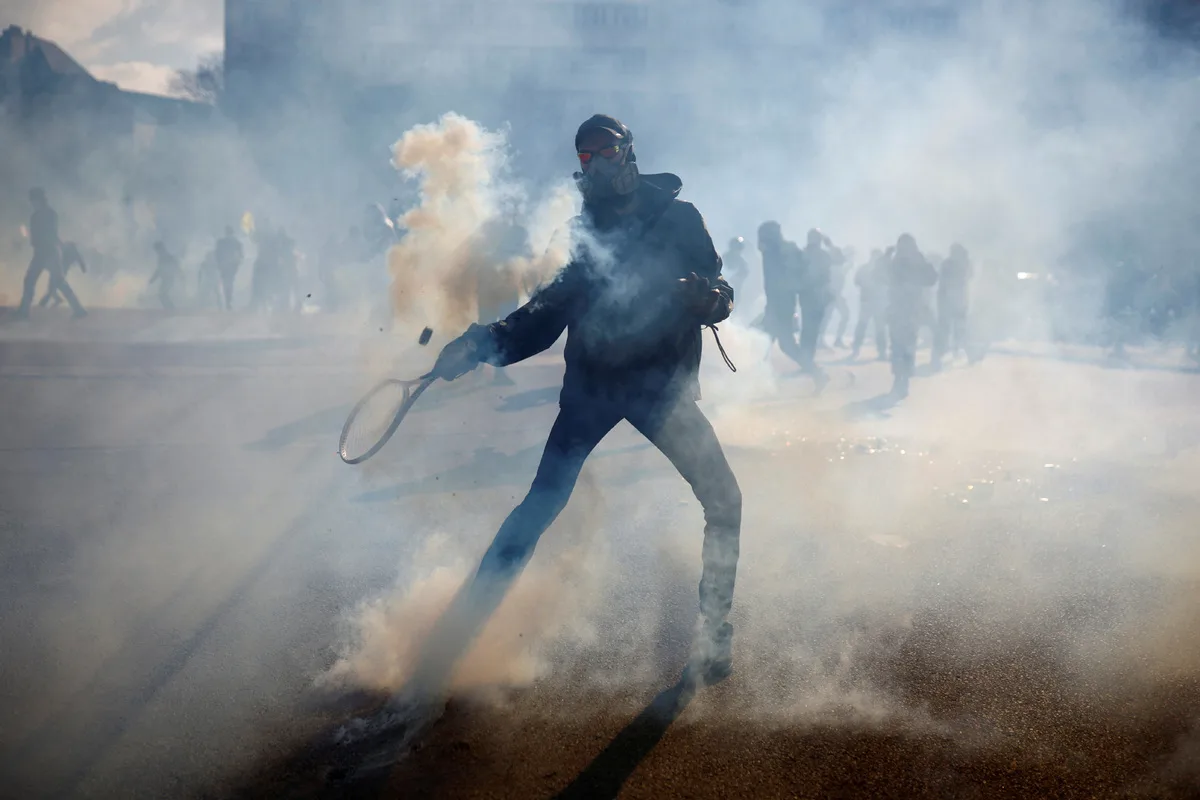
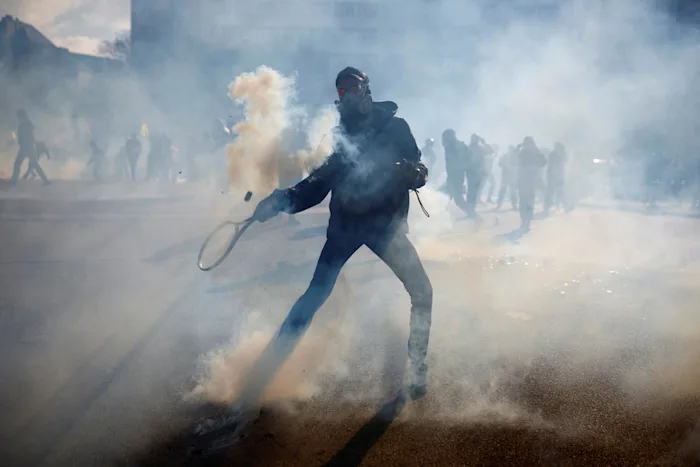
In the same way that socialism is impossible in a single country, it is impossible to impose conditions on the state-capital machine from within one country.
The Western working class had been defeated by the outbreak of the First World War, when the overwhelming majority of the labor movement agreed to submit to their own slaughter for the glory of their respective national bourgeoisies. When the working class and the labor movement redeemed themselves via antifascism, the initiative had already been placed in the hands of the “peasant” revolutions which, by their force, pushed the capitalist centers back to the East. During this era, the Western working classes were integrated into development and, even if they revolted, they would never do so in a way that really threatened the state-capital machine. During this same time, revolutions of the South were being turned either into machines for production or nation-states.
Once the revolutionary threat to the North and its real presence in the South had waned, the balance of power was radically reversed: we began to lose and continue to lose, piece by piece, everything that we had won in those years (the transition from 1960 to 1967, seven years of life captured in a single stroke by capital, is perhaps the clearest sign of defeat). Up until the counter-revolution that began in the 1970s, even when we were defeated politically, we advanced socially and economically. Today, we are losing on both fronts. Today, after the crisis of 2008, decisive struggles are breaking out everywhere (the French March is one of them), but unless the network of insurrections and struggles on the global scale develops anew, and this time subjectively, I doubt that we can break out of the counter-revolutionary cage.
Well-meaning people are proposing to civilize the class struggle at the origin of international wars. We wish them good luck. In a single century (1914-2022), different imperialisms have brought humanity to the edge of the abyss four times: The First and Second World Wars, culminating in Nazism, and the Cold War through which the possibility of a nuclear ending to humanity was concretized for the first time. The current war, of which Ukraine will only be one episode, could revive this latter possibility.
Faced with this tragic and recurrent repetition of wars between imperial powers (not to mention the others), the question we should be asking concerns the reconstruction of international relations of force and the elaboration of a concept of war (which is to say, of strategy) adapted to this new situation. The Communist Manifesto gave us a definition that is still relevant today, even if it has been suppressed or has fallen into the oblivion of pacification: “uninterrupted war, sometimes hidden, sometimes open.” Hidden or open, it always and in every case requires a knowledge of force relations, a strategy, and an art of rupture adapted to these relations. War, historically — but it still seems to be the case today — can give rise either to a “revolutionary transformation,” or to a new accumulation of capital on the global scale. One other possibility that Marx and Engels’ Manifesto considered is also on the table, exacerbated by the current ecological disaster: “the destruction” not only “of both classes in struggle,” but also of humanity.
First published in Effimera, April 14th 2023
Translated by Eric Aldieri
Cover image: Teresa Suarez
Notes
1. La France Insoumise is a populist, left-wing political party in France spearheaded by Jean-Luc Mélenchon. —Trans.↰
2. Michel Foucault, Naissance de la biopolitique: cours au Collège de France, 1978-1979 [The Birth of Biopolitics: Lectures at the Collège de France, 1978-79], Gallimard, 2004.↰
3. Laura Richardson, the head of US military command for the South (who also includes all the countries of Latin America, with the exception of Mexico) has offered a “deal” for Colombia, which was historically allied with imperialism before the change in government. If the country agreed to put fifty old Soviet Mi-8 and Mi-17 helicopters at the disposal of the Ukrainian army, Washington would replace them with new equipment. President Gustavo Petro’s response has been trenchant and differs from the shameful and counter-productive submission of European elites: “We will keep these weapons, even if we have to turn them into scrap metal… We are not in one camp or the other, we are in the camp of peace.”↰